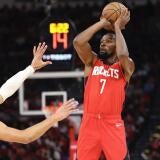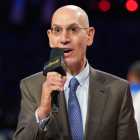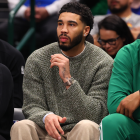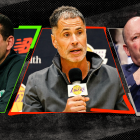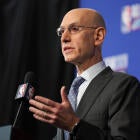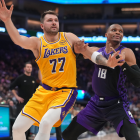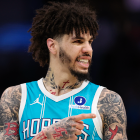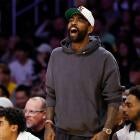Why LeBron James' max contract is latest indictment of Lakers' front office in a summer full of them
Rob Pelinka and the Lakers continue to struggle to build around LeBron James and Anthony Davis
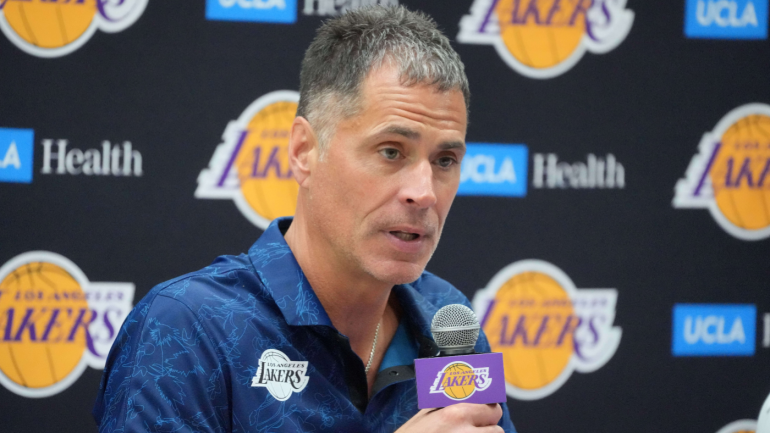
Dwane Casey reportedly said no to becoming an assistant coach under JJ Redick with the Los Angeles Lakers on Tuesday. The move, in itself, is not especially notable. ESPN's Dave McMenamin reported that he did not want to uproot his family, which is an understandable decision that has little to do with basketball. It just underscored a pretty disturbing trend: a lot of people are saying no to the Lakers lately, aren't they?
Think about some of the big-name assistants they had been linked to after hiring Redick. Sam Cassell? Remained with the Boston Celtics. James Borrego, the runner-up for the top job? Stuck with the New Orleans Pelicans. Redick was hired on June 20 and went more than two weeks without securing a single assistant before Wednesday's reported hires of Scott Brooks and Nate McMillan. There was, of course, the highly publicized run at UConn coach Dan Hurley that ended with a low-ball offer. And then on Monday, Klay Thompson, who grew up in Los Angeles with a father who played for the Lakers, elected to join the Dallas Mavericks instead. ESPN's Kendra Andrews and Ramona Shelburne reported that the Lakers offered more money on a longer deal: roughly $80 million over four years.
Individually, you can chalk each miss up to specific circumstances. The Lakers didn't offer Hurley enough money. The assistants could have seen better career prospects elsewhere. DeMar DeRozan has, to this point, brushed off mid-level offers despite reported interest from the Lakers. Thompson joined a team that just reached the NBA Finals in Dallas and therefore seemingly has a better chance to win. But taken as a whole, this is a disturbing trend. We're talking about the Lakers here. You know, the team that has won 17 championships and plays in the NBA's most desirable market. Typically, more people want to be Lakers than the team can reasonably accommodate. Just think back to 2021, for instance. DeRozan was certain he was about to don the purple and gold. He didn't because the Lakers instead chose a different Los Angeles native, Russell Westbrook, as their star addition of the offseason.
To find a time when the Lakers struggled so much to add talent, you have to go back to before James arrived. Remember the failed free agency pursuits of the end of the Kobe Bryant era? Carmelo Anthony said no in 2014. Their first meeting with LaMarcus Aldridge in 2015 went so poorly that they frantically scheduled a second one just to save face. Kevin Durant didn't even grant them the chance to pitch him in 2016.
The difference there was that the Lakers, at that time, were among the NBA's worst teams. Kobe Bryant was never the same after tearing his Achilles. The roster around him deteriorated. Nobody wanted to take the risk of joining a lottery team. But James did. He took a chance on the Lakers when nobody else would. He recruited Anthony Davis to join him. They won a championship, and that duo is still together. Despite concerns over age and injuries, they missed only 17 combined games last season and both earned All-NBA honors. These are not the post-Kobe Lakers. James and Davis very much still have the chance to win.
And James reportedly tried everything in his power to make that happen. Multiple reports have indicated that James was prepared to take a significant pay cut in order to give the Lakers the flexibility they needed to improve the roster. That pay cut, which may have amounted to as much as $20 million, could have given the Lakers the flexibility to either use the mid-level exception or make sign-and-trades below the first-apron hard cap. But James wasn't going to give up that money for just anyone. He had a small list of players he was reportedly interested in. Thompson was among them. So were James Harden and Jonas Valanciunas. DeRozan likely was as well, though that has not been confirmed. The Lakers just couldn't lure any of them. So when he re-signed on Wednesday, he did so at or near his maximum salary. Why bother taking a pay cut for a team that can't make use of it?
There was another factor in the team's failure to secure new star power in the late-Bryant era: uncertainty atop the franchise. Dr. Jerry Buss, the team's patriarch for more than three decades and 10 total championships, died in 2013. Jeanie Buss took over as the franchise's governor. Jim Buss took over as the team's top basketball executive. Though the seeds of decline had long-been planted, dysfunction set in almost as soon as Dr. Buss died. The Lakers reached the playoffs during the 2012-13 season. They missed the postseason in the six seasons that followed. Jim Buss was relieved of his duties in 2017 along with longtime general manager Mitch Kupchak. They were replaced with Magic Johnson and Rob Pelinka. Johnson lasted only two years and publicly accused Pelinka of "backstabbing" on his way out the door.
Pelinka has nominally run basketball operations since, but the team's front office structure is hazy, simultaneously too big and too small. While the Lakers have long been criticized for their limited investment in infrastructural resources like scouting and analytics, there have reportedly been a number of voices who hold significant and varying degrees of influence over basketball decisions. Those include Kurt Rambis, a role player on the Showtime Lakers of the 1980s, his wife, Linda Rambis, who holds the title of executive director of special projects, and Tim Harris, the team's top business executive whom Johnson has accused of meddling in basketball decisions. There are too many cooks in this kitchen, and almost every dish they've served since the 2020 championship has come out sour.
The Westbrook trade? An unmitigated disaster, and even if James pushed for it, they rubber-stamped it. The decision to dismantle the 2020 championship roster? Slightly more justifiable in the moment, shortsighted with hindsight. Three coaching changes in five years? Almost unprecedented given the team's performance in that span. Frank Vogel won a championship and was ousted two years later. Darvin Ham reached the Western Conference finals as a rookie and got one more season.
Two of the three searches in that span have gotten publicly messy. In addition to the Hurley debacle, the Lakers tried and failed to hire Ty Lue in 2019. They wanted a former championship coach to accept a three-year deal and influence over his staffing picks. He obviously balked and would later criticize the Lakers for how they handled that search. "The Lakers [saw it] more so as like [I'm just] coming to coach LeBron," Lue said. "No, I'm coming to win. I just didn't think I was treated fairly. And I wasn't just going to accept any offer just to get a job."
Through this context, it's not hard to see why people might be a bit hesitant to join the Lakers. The team is often a circus. The front office continues to escape accountability for the team's on-court failures even as coach after coach is jettisoned for them. It's not clear what exactly the on-court plan is.
A team with all of the structural advantages that the Lakers have should either be meaningfully contending for a championship every year or at least moving towards that possibility in a focused rebuilding effort. The Lakers, right now, are doing neither. They've hesitated to include future draft picks in trades, with Pelinka citing the difficulties the new CBA creates in constructing deals that work under the cap. Right now, the Lakers are a Play-In team that is just getting older and worse in a conference steadily getting younger and better.
Does a 45-win season really serve anyone here? Not in basketball terms, anyway, though the history-conscious Lakers are likely drawn to the eternal YouTube clip of James taking the floor with his son, Bronny, in their uniform for the first time. In practical terms, though, it's worth asking if there's much of a basketball reason for keeping this team together anymore. If you can't even build a winner with James leaving $20 million on the table, is it reasonable to think there's any path to doing so before a soon-to-be 40-year-old retires? Is holding onto such a player at a max salary or close to it as he likely declines helpful for the Lakers? How about keeping Davis, an injury-prone big man who is probably at the peak of his value right now, for another year or two and risking his own decline? There was a path to a rebuild this offseason that would have given the Lakers a significant head start in terms of assets.
Instead, the team plods forward with a roster the whole basketball world knows isn't good enough. No one wants to jump aboard a sinking ship. There isn't a discernible plan here. There's not an obvious path to fixing all of this short of wholesale changes. Failing to recruit with James, Davis, Hollywood and a bunch of extra money to work with would trigger an identity crisis for most franchises. For the Lakers of the last few years, well, it's sort of just business as usual.





